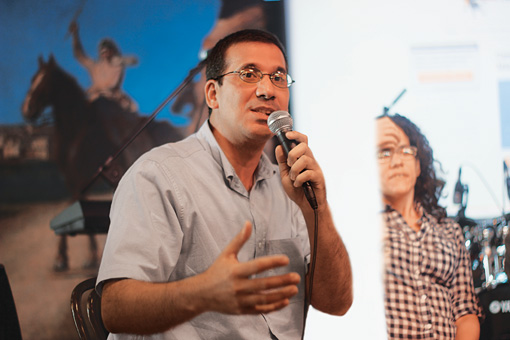When Cuban physicist turned-political-activist Antonio Rodiles, 41, returned home in 2010 after spending 12 years studying in Mexico and the United States, he was immediately frustrated by the enduring limits on free speech. After a half-century of socialism, modernizing reforms known as “Lineamientos”(Guidelines ) had scaled back the public sector’s role in Cuba’s economy and had given Cubans more freedom to travel abroad. But it was still painfully obvious to Rodiles that Cuba lacked “a public sphere where Cuban citizens can critically discuss our everyday reality.”
So in November 2011, Rodiles decided to brave state censorship with the launch of Estado de SATS (State of SATS), a forum for cultural, social and political dialogue among Cuban artists, professionals and intellectuals. He launched the forum with Jorge Calaforra, 48, who served as SATS’ co-general coordinator for the first year.
SATS’ name comes from a Norwegian word that refers to the intense moment of concentration and focus right before an artist begins his or her performance. “We want Cuba to enter into a state of SATS, so that it can burst onto the scene as a new awakened nation,” Rodiles explains.
The organization is best known for its interview series featuring prominent Cuban activists—like Generation Y blogger Yoani Sánchez—discussing life in Cuba from the perspective of their profession or art. SATS has also organized over 70 panels, mostly in Rodiles’ house in Havana, on social activism, the Cuban economy, arts and literature, the state of Cuban media, and other topics.
All programming and content is free, with interviews and events available on SATS’ YouTube page and website (www.estadodesats.com). Due to Cubans’ limited Internet access, SATS’ web content targets an international audience and is available on the island via USB flash drives or DVDs. Organizers fund the low-cost events out of pocket, with occasional small donations from friends and family.
The organization also puts on Cinemaa toda costa (Cinema at All Costs), a program that screens domestic and foreign films that are officially censored on the island. The inaugural screening was of Despertar, a documentary about rapper and political activist Raudel Collazo that was barred from Cuba’s eleventh annual Young Director’s Exhibition. The screening was followed by a discussion with Collazo and Cuban director Ricardo Figueredo Oliva.
While SATS’ content is not an explicit challenge to the Raúl Castro regime, anything dealing with free speech in Cuba is inherently controversial. Rodiles says the government considers many SATS organizers and contributors to be political dissidents and targets them for surveillance.
In response to the harassment he and his colleagues face, Rodiles founded the Por otra Cuba (For Another Cuba) signature-gathering campaign in June 2012 to demand that the Castro government ratify the UN’s International Covenants on Human Rights, which Cuba signed in 2008. The campaign has collected over 4,000 digital signatures.
But Rodiles has paid for his political activity. Detained in November 2012 during a peaceful protest in Havana, he was held without charge for 19 days and says he was repeatedly beaten by police.
Yet his commitment to changing Cuba from within remains steadfast. Rodiles says the more Cuban citizens demand of their government, the harder it will be for the Cuban leadership to maintain what he calls the “pillars of repression.” As he puts it, “Time is against [the Castro regime].”
Meanwhile, after the Cuban government eased travel restrictions earlier this year, Rodiles traveled to Miami at the invitation of the Association for the Study of the Cuban Economy to engage the Cuban diaspora and other allies abroad.
“Democracy is a constant process,” Rodiles says, “and self-expression is a key exercise in practicing one’s democratic right.”




